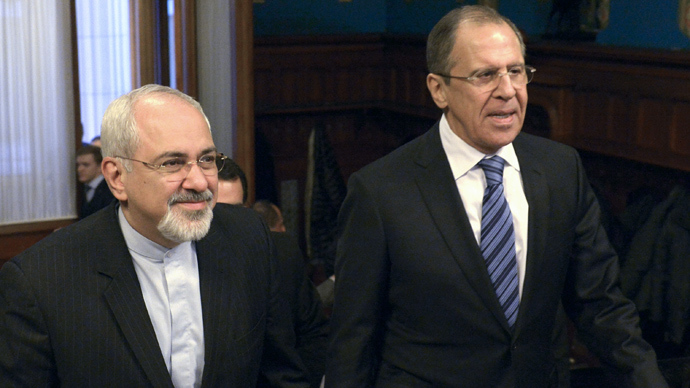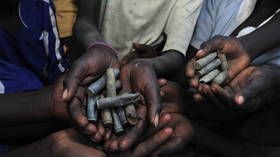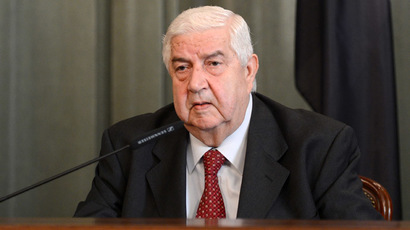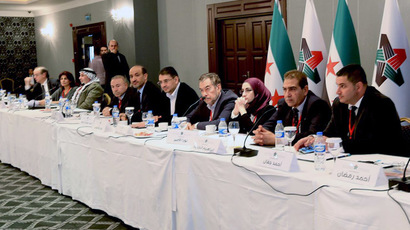Iran invitation puts Syria peace talks at risk

On the eve of the peace talks on Syria, the Geneva-2 conference is on the verge of collapse with the Western-backed Syrian opposition threatening to boycott it unless an invitation for Iran to attend is withdrawn by 19:00 GMT Monday.
Syria's main opposition group, the National Coalition, which had
earlier bowed to Western pressure to join the talks that include
President Bashar Assad’s government, is now saying it will not
attend the talks if the UN does not retract its invitation to
Iran.
"We are giving a deadline of 1900 GMT for the invitation to
be withdrawn," said Anas Abdah, a member of the Coalition's
political committee, told Reuters on Monday.
Abdah reiterated that the Syrian National Coalition would accept Iran's participation only if it “publicly states that it is withdrawing its forces, committing to the Geneva 1 agreement in full and committing to implementing any results of Geneva 2.”
Iran was officially invited to participate in the long-awaited
Syria peace conference scheduled for January 22, UN
Secretary-General Ban Ki-moon announced Sunday. Tehran has agreed
to send its representatives to Geneva.
Ban said that Iranian Foreign Minister Mohammad Javad Zarif had
assured him that Tehran “understands that the basis of the
talks is the full implementation of the 30 June 2012, Geneva
communiqué.” The UN chief said they agreed that the goal of
the talks was to “establish by mutual consent a transitional
governing body with full executive powers.”
However, Iran's deputy foreign minister Hosein Amirabdollahian
voiced a different position.
“Setting such a condition to accept the Geneva 1 agreement
for attending the Geneva 2 meeting is rejected and
unacceptable,” he said, as cited by INSA news agency.
“Iran will attend the talks without any precondition, based
on an invitation by UN Secretary-General Ban Ki-moon.”
Russian Foreign Minister Sergey Lavrov supported the UN decision to invite Iran, saying that without the country the talks would be “profane.”
"Around 40 countries have been invited to the conference, including Australia, Mexico, Korea, Brazil, India and Indonesia,” Lavrov told a media conference in Moscow. “If Iran were not on the list, that would seem profane.”
Lavrov described the opposition’s statement as “capricious” and proof that it’s not genuinely interested in resolving the Syrian crisis.
“If one starts being so capricious… The government agrees without any conditions to participate in the talks, to which countries which directly provide the opposition with funding and weapons, including those not moderate at all, have long been invited. So what should it do, demand that those countries withdraw?” Lavrov asked. “Negotiations are about bringing to one table not those who you like, but those upon whom solving the problem depends.”
The US argues that Iran has done nothing to ease tensions in
Syria and its participation in the conference will not be
helpful, according to a senior State Department official.
Tehran’s statements on Syria talks “do not meet the bar”
to attend the talks, the official said Monday, Reuters reports.
Several hours before the deadline set by the opposition expires, the UN chief said “intensive and urgent discussions” were under way.
“For the moment, let me just appeal again to all involved to keep the needs of the Syrian people foremost in mind,” Ban told the 15-nation Security Council during a meeting on the situation in the Middle East.

Tehran is the main foreign supporter of Syrian President Bashar
Assad and its participation in the conference in Switzerland has
been one of the stumbling blocks in preparing the talks.
Saudi Arabia, which has strongly backed groups fighting Assad's
forces, has come out against Iran’s attendance at the talks.
An official of the Saudi Arabian King's Office said Monday that
Tehran's delegation will be able to arrive in Geneva only if a
transition government, which will be formed in Syria, agrees, AP
reports, citing Arab media.
Another official source cited by Saudi press explained that Iran
should not attend because of its stance on Geneva 1 and its
military support for the government forces.
Iran did not accept the agreement reached at the first Syrian peace conference in June 2012, known as the Geneva Communiqué. The document outlined steps for a peaceful solution to the ongoing crisis, including the establishment of a transitional governing body. Tehran’s public support for the document has been one of the preconditions laid down for its participation in the Geneva 2 talks. Iran, however, has maintained that it will not accept any preconditions.
‘UN peacekeepers in Aleppo is hoax’
Sergey Lavrov dismissed as rumor the information that UN peacekeepers could be sent to Aleppo.
"I’ve never heard of this,” he said. “I think it’s another hoax. There are many who are willing to use any chance to let some international military forces into Syria.”
He recalled that the plan was to reach a deal between the Syrian government and the opposition so as to open safe humanitarian corridors to Aleppo in order to guarantee security to humanitarian agency workers.
Lavrov suggested certain forces have been trying to use the humanitarian crisis as a pretext for military action. He said before that there were attempts at achieving the same purpose by means of “the artificially created chemical weapons crisis, when all of the blame for the provocations by the opposition forces was laid on the government.”
On Friday, Damascus handed over to Moscow a plan for a ceasefire in the city of Aleppo, asking Lavrov to assist in passing it to the Syrian opposition in order to ensure the implementation of the plan.














